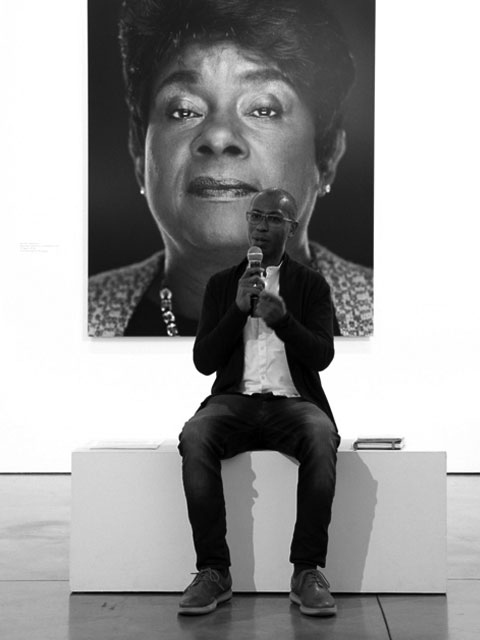Photographer Franklyn Rodgers pays homage to a figure sacred in his life: his mother, Loretta.
Over several years, Rodgers photographed Loretta and the circle of friends important to her. The large-scale portraits in Devotion recognise the significance of these close-knit relationships: mother and son, and between friends.
His visual care for such deeply personal subjects is evident in the exquisite and refined grandeur of these works, the result of a methodology built on intimacy and trust. Rodgers’ photographs investigate what it means to look into the human face.
He drew inspiration from work of French philosopher Emmanuel Levinas, who claimed that our individual obligations and morality are found in the recognition of the suffering and mortality of others. Identity becomes both a departure and return to the self.
This exhibition is an act of devotion to his mother and the intimate familial moments of love, care, tenderness and affection in these relationships. Loretta and the devoted network around her are a testament to the case for greater safekeeping and care across the human condition.

Since the mid 1990s, Franklyn Rodgers has established himself as an artist best known for his unique and distinctive photographic portraits - often working with large format and on traditional film.
Rodgers has exhibited internationally, including at the United Nations Headquarters in New York (2011); Southbank Centre in London (2011); National Portrait Gallery in London (2008); Royal Academy in London (2006); The Studio Museum in Harlem, New York; and during Les Rencontres d’Arles in France.
His work is held in the permanent collections of the National Portrait Gallery, Tate Britain and Autograph. His first monograph The Philosophy of Strangers was published in October 2007 by Autograph.
Autograph commissioned Frankyln Rodgers to create a new portrait of Baroness Doreen Lawrence of Clarendon, commemorating her devotion to seeking political and social justice
View commission


Banner images: 1) Frankyln Rodgers, Loretta Rodgers [detail], 31 January 2006.
Exhibition preview: 1) Franklyn Rodgers: Devotion – A Portrait of Loretta. Gallery installation at Autograph, London. 27 April – 7 July 2018. Photo: Zoë Maxwell. 2) Franklyn Rodgers, Mrs Iris Simms, 2013. 3) Frankyln Rodgers, Loretta Rodgers, 31 January 2006. 4) Frankyln Rogers, Myrna German, July 2017.
Other images: 1) Franklyn Rodgers giving an artist talk at Autograph, London 2018. 2) Doreen Delceita Lawrence, Baroness Lawrence of Clarendon, OBE portrait on display at the Franklyn Rodgers: Devotion - A Portrait of Loretta exhibition at Autograph, London. Photograph by Zoë Maxwell.
Autograph is a space to see things differently. Since 1988, we have championed photography that explores issues of race, identity, representation, human rights and social justice, sharing how photographs reflect lived experiences and shape our understanding of ourselves and others.